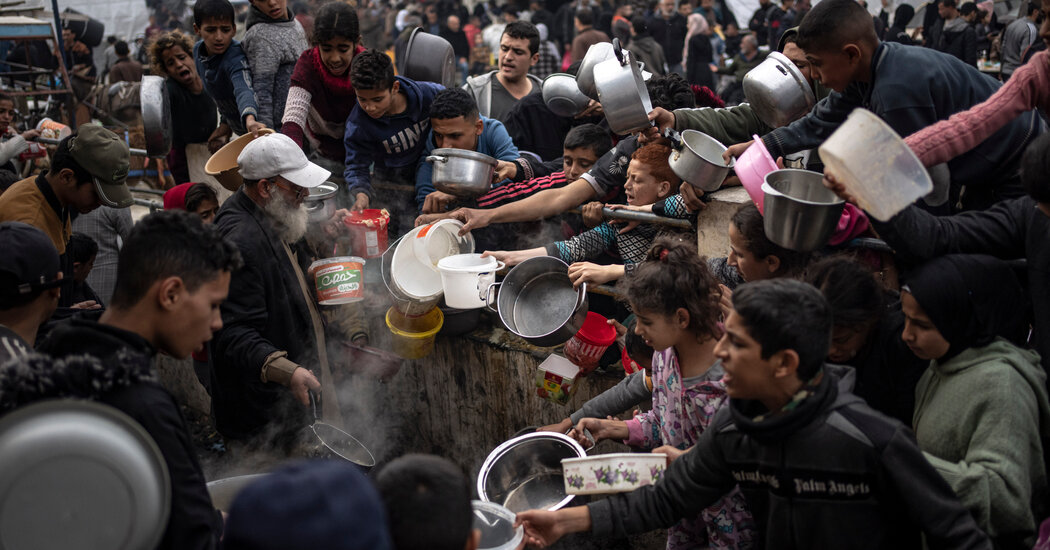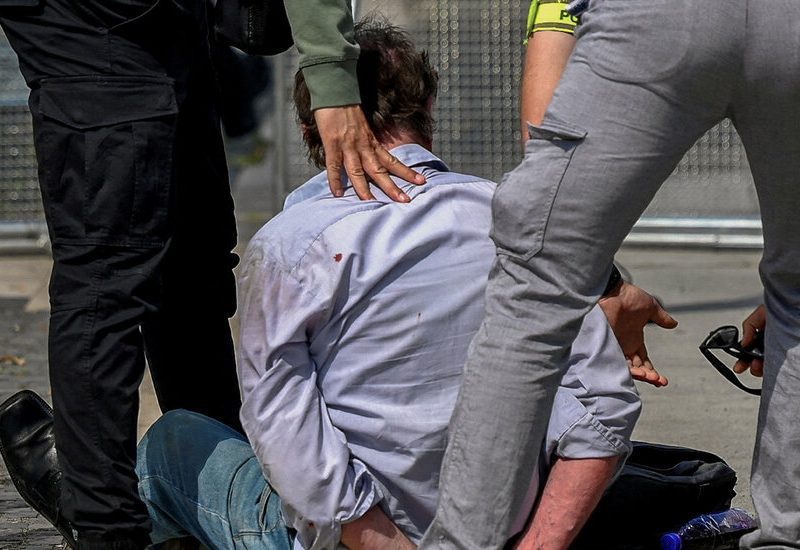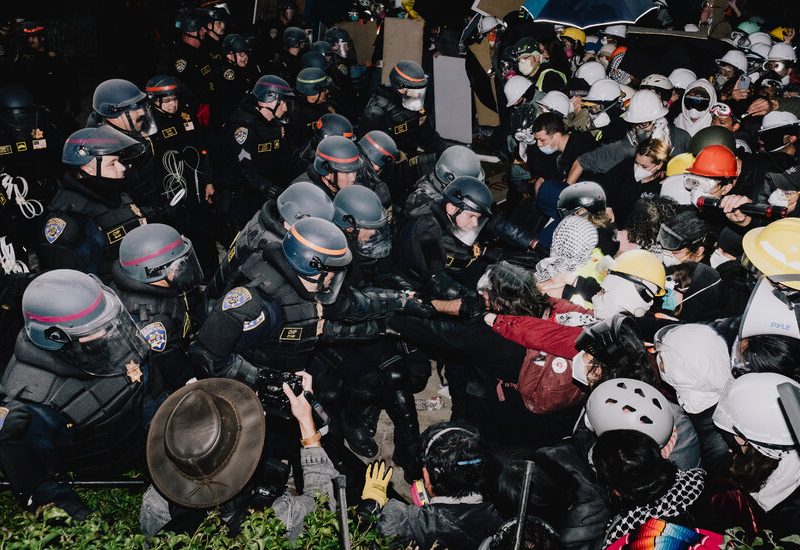On March 19, Volker Türk, the United Nations’ human rights chief, said in an official statement that Israel’s policies regarding aid in Gaza might amount to a war crime.
“The extent of Israel’s continued restrictions on the entry of aid into Gaza, together with the manner in which it continues to conduct hostilities, may amount to the use of starvation as a method of war, which is a war crime,” he wrote.
His comments made waves. Using starvation of civilians as a weapon is a serious violation of international humanitarian law, and a war crime under the Rome Statute, the treaty of the International Criminal Court, or I.C.C.
Israeli and foreign officials told The New York Times last week that they were worried that the I.C.C. was preparing to issue arrest warrants against senior Israeli officials — including potentially over accusations that they prevented the delivery of aid to civilians in Gaza. (They also said they believed that the court was considering arrest warrants for Hamas leaders, which could be issued concurrently.)
Let me be clear: There is a high evidentiary bar for war-crime prosecutions, and we have no way of knowing at this stage what a full investigation would reveal, particularly because independent observers have had limited access to Gaza.
We do know that a humanitarian crisis is underway in the enclave and that the specter of famine has loomed increasingly close in recent weeks. Months of Israeli restrictions have prevented the delivery of sufficient aid into Gaza, and it has proved even harder to bring it into the northern part of the strip, which is under Israeli military control and is where the hunger crisis is most severe.
The active nature of the conflict has also curbed aid distribution: The mass displacement of civilians, a lack of police to protect aid convoys, and the violence itself have stopped some aid from reaching the people who need it most. Aid workers have been killed while trying to do their jobs. All of this has contributed to the “catastrophe” that Türk described: widespread malnourishment and the deaths of children and other vulnerable people from starvation and starvation-related diseases.
When I reached out to the Israeli military for comment this week, it said in a statement that since Hamas’s Oct. 7 attack, Israel had been “engaged in a war against the terror organization” and that it had worked in coordination with the U.S., Egypt and international aid groups to get aid to Gaza residents. “Israel is constantly making significant efforts to find additional solutions to facilitate the flow of aid to the Gaza Strip and in particular to the north,” a spokesperson added, saying this was evident in the coordination of airdrops and aid packages coming via sea.
Israel has previously vehemently denied placing limits on aid, accusing the United Nations of failing to distribute aid adequately, and Hamas of looting supplies. U.S. and U.N. officials have said there is no evidence of that, other than one shipment that Hamas seized earlier this week, which is now being recovered. In recent weeks, under pressure from the United States and other allies, Israel has loosened some restrictions and there has been a modest increase in aid deliveries.
It is not yet clear whether any I.C.C. warrants are actually imminent, or if they would be made public — warrants can be issued secretly and kept under seal. It is also possible that the warrants, if issued, could refer not to starvation but to other crimes. Under the I.C.C.’s rules, a warrant requires “reasonable grounds to believe” that a suspect has committed the crime in question. I’m going to examine how that standard might apply to the war crime of starvation of civilians, and why it matters.
What is the threshold for criminal liability?
Although intentionally starving civilians has been considered a violation of international humanitarian law since at least the 1970s, it was only designated as a war crime in 1998, when the I.C.C. was established. And no international tribunal has ever tried someone for the crime of starvation of civilians as a weapon of war.
There are two main elements of the crime, according to the I.C.C. statute. The first is the act itself: actions or policies that deprive civilians of “objects indispensable to their survival,” including by interfering with relief supplies. The second is the intent: Starvation must be deliberately used “as a method of warfare.”
Some legal experts point to an announcement made by Israel’s defense minister, Yoav Gallant, two days after the brutal Hamas-led assault on Israel, in which over 1,200 people were killed, as evidence of Israeli intent.
“We are imposing a complete siege,” Gallant said, adding, “There will be no electricity, no food, no water, no fuel, everything is closed. We are fighting human animals and we act accordingly.”
In the days that followed, other officials, including the energy minister and the head of the Israeli agency that oversees policy for the occupied territories, also pledged that Gaza would be completely cut off from outside supplies. No aid trucks were allowed into Gaza until Oct. 21, nearly two weeks after Gallant’s statement. Because the strip was already heavily reliant on receiving essential supplies from Israel, that had an immediate impact on civilians.
The publicly announced “complete siege” created a plausible basis to believe the elements of a war crime had been met even before actual starvation took place, according to Tom Dannenbaum, a professor at the Fletcher School at Tufts University who is an expert on the law of sieges and starvation.
“I don’t think there’s really any other way of understanding the declaration of the total siege, and the specific identification of food and water as core components of the list of objects that would be deprived, as anything other than denial of those objects for their sustenance value,” he said.
Israel has said that its officials’ statements about the siege were not a true reflection of its policies, and pointed to an Oct. 29 cabinet meeting at which Prime Minister Benjamin Netanyahu said that “we must prevent a humanitarian disaster” and directed that aid to the Gaza Strip should be increased, along with other cabinet decisions that it says show its efforts to send aid to the territory.
Getting aid in
Israel conducts rigorous checks of the aid trucks that line up at border crossings to bring food and other humanitarian supplies into Gaza, in an attempt to block items that could be used by Hamas. Those inspections have often been slow, aid agencies say, and can result in entire trucks getting rejected for “dual-use” items, such as medical scissors and water filters, that Israel says could have military as well as civilian purposes.
After Oct. 21, Israel began to allow some aid into Gaza, but its restrictions continued to make it impossible to bring in and distribute enough to avert a humanitarian crisis there, according to the United Nations and aid organizations.
The European Union’s top diplomat, Josep Borrell Fontelles, told the U.N. Security Council on March 12 that “the natural way of providing support through roads is being closed, artificially closed,” in Gaza, and that “starvation is being used as a weapon of war.”
Tal Heinrich, an Israeli government spokesperson, called Borrell’s statement “false and outrageous” and said that there was “no restriction on the amount of food and water” allowed to be delivered to the Gaza Strip.
In a March 15 letter to a British parliamentary committee, David Cameron, Britain’s foreign secretary, expressed his “enormous frustration” that aid supplied by the United Kingdom had been “routinely held up” on its way to Gaza. “The main blockers remain arbitrary denials by the government of Israel and lengthy clearance procedures including multiple screenings and narrow opening windows in daylight hours,” he wrote.
Before Oct. 7, around 500 trucks entered Gaza each day, carrying both aid and commercial items, Mr. Cameron said. That number fell by approximately 75 percent in the early months of the conflict, and although there has been a modest increase in April, the most recent weekly average for which figures were available was only 202 trucks per day, according to the U.N.
As of April 17, at least 28 children under 12 had died of malnutrition or related causes in Gaza hospitals, according to local health authorities, including a dozen babies under a month old. Officials believe that many more deaths outside hospitals have gone unrecorded.
According to international law, Israel has a right to do things like inspect aid convoys for items that might aid Hamas, such as weapons, and set the times and routes for humanitarian access. But the right is not limitless, experts said: Context matters.
“If there’s not a prospect of civilian starvation, one can engage in that kind of action for those military reasons other than sustenance denial,” Dannenbaum, the Tufts professor, said. But once civilians are at risk of starvation, a party to the conflict “cannot abuse the authority to inspect and set times and routes in a way that arbitrarily impedes humanitarian access to starving civilians,” he added.
Yuval Shany, an international law professor at Hebrew University in Jerusalem, said that such restrictions could potentially satisfy the criminal statute’s intent requirement. “When you are blocking the aid, and the inevitable consequence of doing that is starvation, then you are in an area where knowledge and intent actually collapse into one another.”
What might happen next?
There have been some improvements to aid flows in recent weeks, and on Wednesday Israel reopened the Erez border crossing, allowing some aid to cross directly into northern Gaza, where the humanitarian crisis is most acute. But foreign officials and aid agencies say it is still not enough. “This is real and important progress, but more still needs to be done,” Antony Blinken, the U.S. secretary of state, told reporters this week after visiting an aid warehouse in Jordan.
Legally, improvements now do not cancel out possible criminal liability for past actions, Dannenbaum said.
But also, having reasonable grounds for a warrant is not the same thing as having sufficient evidence for a conviction.
“Those inquiries tend to be extraordinarily factually intensive, requiring long and painstaking investigations by the prosecutor’s office,” said Chimène I. Keitner, a law professor at the University of California, Davis, and a former international law adviser for the U.S. State Department.
At this stage it appears unlikely that any Israeli official would actually stand trial in the International Criminal Court, even if warrants are issued. The court, which has no police force to carry out arrests directly, relies on national governments to arrest suspects within their territories. Individuals who avoid I.C.C.-friendly jurisdictions are therefore fairly safe.
If I.C.C. indictments were announced, however, they would bolster a growing international perception that Israel’s actions in Gaza have violated international law. And that could contribute to the growing political pressure on Israel’s allies to limit their support for Israel, Keitner said.



